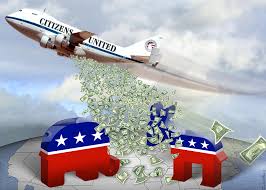Ten years ago, the U.S. Supreme Court issued its disastrous ruling in Citizens United, giving corporations the right to unlimited political spending. Since then, independent groups unrelated to political parties have poured $4.5 billion into federal elections, including almost $1 billion of secret “dark money” that cannot be traced to its source. Raising further concerns, a significant amount of that political spending comes from foreign-influenced U.S. corporations.
Americans are demanding bold reforms to protect elections and make elected leaders more accountable to voters. The good news is that a popular solution exists, and it’s gaining newfound momentum: a ban on election-related spending by foreign-influenced U.S. corporations.
In his 2010 State of the Union address, President Barack Obama issued a dramatic warning about the just-issued Citizens United decision. Standing only feet away from the high court’s justices, Obama predicted that Citizens United would “open the floodgates for special interests — including foreign corporations — to spend without limit in our elections.” Justice Samuel Alito, a member of the Supreme Court’s conservative majority that decided Citizens United, could be seen mouthing the words, “not true.” Obama declared, “I don’t think American elections should be bankrolled by America’s most powerful interests, or worse, by foreign entities.”
Unfortunately for our democracy, Obama’s warning was accurate. Americans have witnessed the inglorious rise of super PACs and a deluge of corporate and secret dark money political spending, which have warped our political and policymaking processes. At the same time, the United States has fallen victim to Russian interference in the 2016 presidential election, continued foreign interference efforts in advance of the 2020 presidential election, and President Donald Trump’s unconstitutional solicitation of foreign assistance for his re-election.
One way to reduce foreign influence in our political system is to impose brightline foreign ownership thresholds. A key threshold would say that if foreign entities (governments, companies or persons) own more than 5 percent of a U.S. company, that company would not be permitted to spend money in American elections.
For example, foreign ownership thresholds would prevent U.S.-based Uber from spending tens of millions of dollars in local, state and federal elections while Saudi Arabia owns 10 percent of Uber and controls one of its board seats. Most of the largest publicly-traded U.S. corporations exceed the 5 percent threshold, although many smaller companies, which generally have fewer foreign shareholders, could continue their political spending.
American companies reasonably want to attract foreign investment. In fact, 35% of all U.S. stock is now owned by foreigners. But foreign investors’ interests can diverge from Americans’ interests, and corporate CEOs are legally obligated to look out for their foreign investors. This dynamic once led ExxonMobil’s CEO to say, “I’m not a U.S. company and I don’t make decisions based on what’s good for the U.S.”
It’s little wonder that political leaders are increasingly endorsing the use of foreign ownership thresholds to bar political spending by American corporations.
Several months ago, Senator Elizabeth Warren, D-Mass., announced her support as part of a broad pro-democracy reform plan.
Just last week, Seattle became the second city in the nation, after St. Petersburg, Florida, to pass this policy into law. The Seattle City Council sprang into action after a sharp uptick in election spending by foreign-influenced U.S. corporations, including Amazon, which dumped $1.5 million into the 2019 city council races to try to elect its preferred candidates.
Similar legislation is pending in several states, such as Massachusetts and Maryland.
Federal lawmakers are also giving this policy a fresh look. Historic democracy reform bills that passed in the U.S. House of Representatives last year — including H.R. 1 — made big improvements that would discourage election-related spending by foreign-influenced corporations and reduce foreign influence in U.S. elections. It’s noteworthy that in 2010, shortly after Citizens United was decided, the House passed legislation that included foreign ownership thresholds, but a Republican-led Senate filibuster killed the bill by one vote.
And while new laws are being considered, the chair of the Federal Election Commission, Ellen L. Weintraub, is leading a sustained battle at the agency to update regulations to include this policy solution.
Most Americans — especially marginalized communities — know that their preferred candidates or policies are not accurately reflected when elections are heavily influenced by foreign entities and corporate spending. We cannot allow American self-governance to be threatened by corporations that are accountable to foreign investors.
Bold solutions like barring political spending by foreign-influenced U.S. corporations would be a giant step forward toward strengthening our democracy.

